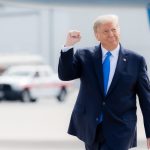The political circus took center stage recently during a hearing where Rep. Pat Fallon of Texas exchanged some blows—figuratively speaking, of course—with Acting Secret Service Director Ronald Rowe. The hearing was ostensibly focused on the assassination attempt against President Trump, but it seemed to devolve into an episode of “As the Capitol Turns,” complete with raised voices and accusations flying like confetti.
The drama kicked off with Fallon accusing Rowe of abandoning his protective duties in order to grab a coveted seat behind Trump during this year’s 9/11 memorial. Congressional aides even flaunted a photograph that illustrated Rowe’s surprising presence right behind the former president. Fallon fired off that Rowe, in his role as special agent in charge, should have been right next to Trump, where he could actually do his job instead of posing for a photo op. Talk about a bad look for someone who’s supposed to be safeguarding the President.
In what might be seen as a textbook example of the hearing turning chaotic, Rowe started bringing up his experiences from the aftermath of the September 11 attacks. That information was meant to bring some emotional gravity into the mix, but all it did was raise Fallon’s blood pressure. Fallon, clearly uninterested in Rowe’s self-congratulatory anecdotes, snapped back with all the subtlety of a sledgehammer, asserting he was merely trying to ask professional questions of a public servant who was acting oddly.
The exchange quickly spiraled into a shouting match—because why wouldn’t it? Rowe insisted that he was there as a public servant paying his respects, but Fallon wasn’t buying it. He insisted Rowe’s presence was politically motivated and relegated to mere optics. At this point, it became clear that Fallon had zero tolerance for what he perceived as Rowe’s grandstanding. The hearing transformed into a stage for Fallout: Secret Service Edition, replete with finger-pointing and claims of “playing politics.”
The verbal fireworks didn’t deter Fallon from establishing his position that Rowe undermined the protective detail of the president and vice president. In a moment that truly could have been ripped from the pages of an absurd comedy, Fallon continued to hammer Rowe with questions about his presence, implying that the acting director acted like an “interloper.” Meanwhile, Rowe asserted the very existence of the Secret Service wasn’t compromised by his location. The irony was thick enough to cut with a knife—here they were, arguing over optics while the Secret Service faced intense scrutiny following a serious security lapse.
GOP Texas lawmaker spars with Secret Service chief during Trump assassination attempt hearing https://t.co/iY3mCADJkJ
— Washington Examiner (@dcexaminer) December 6, 2024
After the hearing, Fallon made a bold claim that Rowe should have attended the event as a dignitary rather than getting involved in the crucial security operations. He even went so far as to accuse Rowe of ruining the attitudes of actual agents, who, Fallon alleged, expressed complaints about Rowe’s inappropriate positioning. It’s like a game of political hot potato, with Rowe stuck in the middle, trying to explain himself while Fallon played the role of the tough public servant demanding accountability.
With tensions already high and the future of Secret Service operations under a microscope, one thing is for certain: If the Secret Service is going to manage the protection of our leaders, they may want to take a lesson from this debacle and keep the soap opera antics at bay. It might be time for them to take a page from the no-nonsense playbook—less drama, more security.




